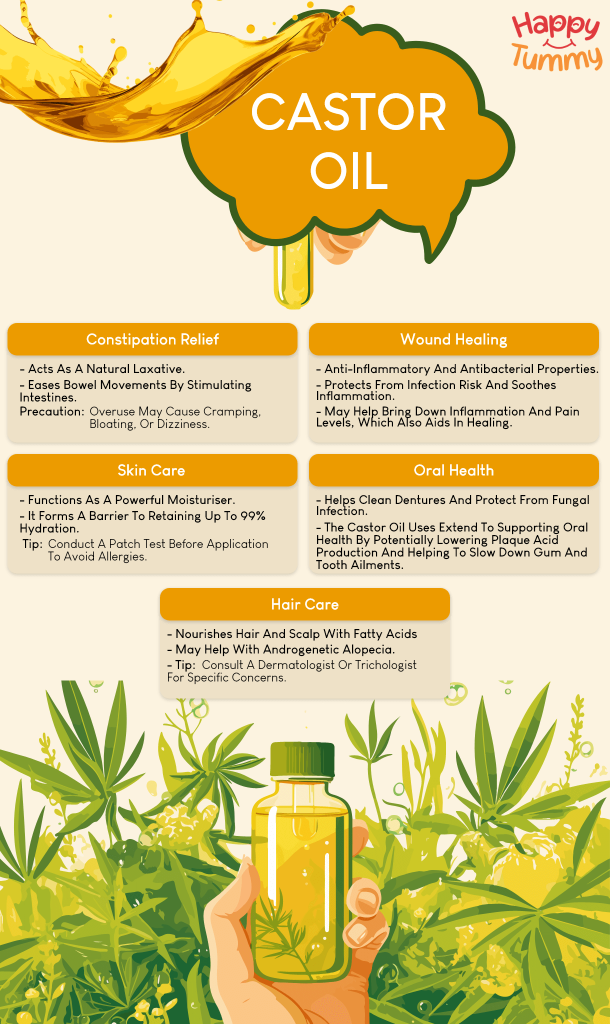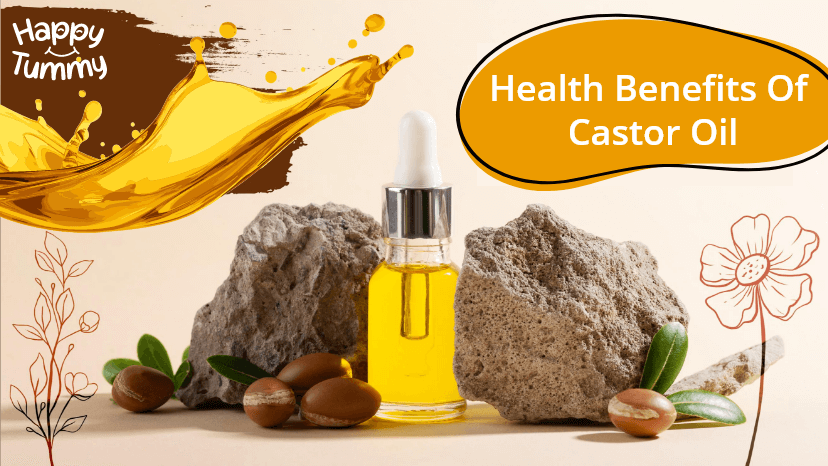Table of Contents
Castor oil uses date back to ancient and medieval times when it was valued for its versatility in cosmetics, beauty routines, and various medicinal applications.
In some cultures, especially where natural products are widely used, it is still preferred.
However, as the concept of health and new medical science changes, most of these uses are not well substantiated.
With changing lifestyles and health needs, it’s important to approach the castor oil benefits thoughtfully.
Thus, in this blog, we will explore evidence-based castor oil uses, helping you make informed decisions about incorporating this oil into your wellness practices.
5 Castor Oil Benefits

1. Castor Oil Uses for Constipation
- Castor oil, in traditional medicine, is famous for being a potent natural laxative and a remedy for constipation.
- One research found that employing castor oil packs (COP) was not effective in increasing the frequency of bowel movements in elderly patients. However, it made stools easier to pass and reduced straining, helping relieve constipation symptoms [1]. This study showcases one of the many castor oil uses that promote digestive health.
- It may aid in stimulating the intestines, which may help push stool through the digestive system and ease bowel movements [2].
- One notable benefit of castor oil on the stomach is its purgative effect [3]. Thus, it may induce bowel movements and clear waste from the digestive system.
- If you’re dealing with ongoing constipation or have health concerns, consult a healthcare professional before using castor oil, as it may not be suitable for everyone.
- While this oil may help address constipation, improper use may lead to abdominal cramping, steatorrhea (fat in stools), vomiting, bloating, dizziness, and other gut complications, emphasising the need for careful dosage [4].
A lot of people suffer from constipation because of improper nutrition that does not include enough fibre, but such a problem can always be solved with the help of a proper diet and a general lifestyle [5].
To better understand your digestive health, take the Aashirvaad Digestive Quotient test, which assesses your digestive wellness based on fibre intake.
It may assist you in making an informed transition to a healthier diet for your gut.
2. Castor Oil Benefits for Skin
- Another remarkable castor oil benefit is its ability to act as an occlusive moisturiser. It creates a layer on the skin surface that acts as a barrier and minimises the rate of water loss to almost 99%, thus leaving the skin soft and hydrated [6].
- Such moisturising qualities make it a popular cosmetic ingredient [7]. It may help enhance the texture and effectiveness of various skincare products, providing nourishment and hydration.
- Also, to ensure safety when exploring the uses of castor oil for skin, it’s essential to conduct a patch test first. It helps determine the possible allergic reactions, if any.
3. Wound Healing
- The use of castor oil for skin includes wound healing, as it may provide a soothing effect that creates a more comfortable environment for the skin during recovery.
- Castor oil benefits come from its ricinoleic acid, which has anti-inflammatory and antibacterial properties [8]. It might inhibit the growth of bacteria, viruses, moulds, and yeasts [9], which could help manage infections in wounds.
Further, it may help bring down inflammation and pain levels, which also aids in healing.
4. Oral Health
- One more notable benefit of this oil is its potential to contribute to better dental hygiene, especially for those who wear dentures.
- Specifically, a more recent work discussed the efficiency of castor oil benefits for those who use dentures. It was found that the oil may help clean dentures by removing sticky film and reducing fungal growth. Participants reported satisfaction, highlighting castor oil uses and benefits for maintaining oral health and hygiene [10].
- The castor oil uses extend to supporting oral health by potentially lowering plaque acid production and helping to slow down gum and tooth ailments [11]. All such factors may help enhance dental health.
5. Castor Oil Benefits for Hair [12]
- Today, this oil is used in many hair care products, for instance, hair oils. Because of ricinoleic acid, it has properties that make it a good moisturiser, helping the hair not to dry up easily.
- Their fatty acids easily penetrate the hair shaft and may nourish hair follicles.
- It contains compounds that may protect the scalp surface and hair from fungal and microbial infections.
- As for those with androgenetic alopecia, it may be of help since ricinoleic acid can pass through the skin and may inhibit specific substances that may well affect hair growth.
- While many people share positive experiences about castor oil’s benefits for hair, more scientific studies are needed to understand how it works.
- The castor oil uses for hair care is widely talked about. However, you must speak to your dermatologist and trichologist if you have a specific hair condition or have experienced any irritation after the application.
While exploring the advantages of castor oil for hair, it’s important to remember that good nutrition plays a crucial role in maintaining healthy hair.
If you are interested in testing how well you are doing on the dietary front, consider taking the Aashirvaad My Meal Plan Test.
It can help you determine if your diet lacks fibre, one of the essential dietary factors, and provide you with a personalised meal plan with the recommended nutrient levels.
This way, you not only enhance your hair but also the rest of your body to work at its optimal potential.
Things to Consider
- The castor oil uses may vary from person to person, and how it affects someone may depend on their health and body conditions.
- Avoid taking this oil if you are on other medications, especially laxatives or diuretics.
- Pregnant women should avoid using this oil as a laxative, as it may induce contractions [13].
- Also, its administration to infants should be avoided, and those who are breastfeeding should consult a healthcare provider first [14].
- Older patients need to use oil cautiously due to a higher risk of side effects related to kidney and heart health, as well as possible fluid imbalances [15].
- Frequent use of castor oil as a laxative may lead to abdominal cramping, vomiting, bloating, and dizziness, so it’s best to use it sparingly and under a doctor’s supervision [16].
- While there might be benefits of castor oil on the stomach, you should still be cautious and consult a doctor if you have ongoing stomach or gut issues.
- Remember to test a small area first to ensure no adverse reactions when considering the castor oil benefits for the skin or hair.
Can we apply castor oil on the lips?
One may use castor oil as an effective natural remedy for dry or cracked lips due to its moisturising properties. Many lip glosses and balms contain castor, which may help keep lips soft and hydrated.
Apply a small amount as needed throughout the day. However, be cautious if you have sensitive skin, as some individuals may experience allergic reactions [20].
Doing a patch test first ensures you don’t have any adverse reactions before using it regularly.
Can I put castor oil on my face?
Castor may be good for your face since it possesses the ability to moisturise the skin. It has already been used in various cosmetic products. This natural oil may help to hydrate dry skin and improve overall texture.
Besides, its anti-inflammatory and antimicrobial properties may assist in managing acne.
It’s anecdotal evidence, which means those who have used it have said that the oil may help with acne, although no scientific research backs up such claims.
Individuals with oily skin/ acne prone skin should be cautious while using castor as it may aggravate the acne.
Another thing you should be careful about is always applying a drop of oil to a clean, small area of the skin first to make sure it doesn’t cause any irritation.
Also, consider mixing it with a lighter carrier oil to avoid potential clogging of pores. Always listen to your skin’s response and adjust usage accordingly.
What happens when you rub castor oil on your feet?
Application of castor oil on the feet might benefit by soothing dry and cracked skin. It may also manage inflammation and discomfort from sore feet while promoting healing.
Additionally, this oil has antifungal properties that might combat infections such as athlete’s foot.
For best results, apply the oil generously, massage it, and wear socks overnight to lock in moisture, leaving your feet feeling rejuvenated and smooth over time.
Final Thoughts
While castor oil uses might be helpful in various areas of wellness, we need more research to understand its effects on different aspects of human health.
One must not be influenced by trends or mainstream opinions but make informed choices based on individual health conditions.
For optimal health, you may consult a nutritionist, who can provide personalised guidance on what should be included in your diet and address specific health concerns.
A balanced diet remains essential for overall well-being, ensuring you meet your body’s unique needs while exploring natural options like castor oil benefits.
FAQs
The common use people know about castor oil is that it may help with constipation. It has the characteristics of a very good laxative that facilitates bowel movements. Besides this, it contains a special compound called ricinoleic acid, which may have various effects on the body.
It is also used in some medicines to help deliver drugs more effectively. Overall, while its main use is for relieving constipation, it also has other helpful properties in medicine [17]. In addition, it has been deemed to have a significant business use, mainly for the production of soaps, cosmetics, lubricants and coatings, among others [18] [19].
Castor oil should not be taken by pregnant or breastfeeding women since it may cause contractions and may not be suitable for the baby.
Besides, individuals with certain medical conditions, such as bowel obstructions, appendicitis, or inflammatory bowel disease (IBD), fatty liver, cardiovascular diseases, should also refrain from using it due to potential serious side effects.
Additionally, those with allergies to the oil or its components should consult a healthcare professional before use to ensure safety and prevent adverse reactions.
Being rich in anti-inflammatory value and possessing antimicrobial properties, castor oil might be highly effective for wound healing. Its main component, ricinoleic acid, supports these effects, which may help manage pain and infection in wounds. With its moisturising property, this natural oil may promote faster healing. Its ability to lock in moisture makes it ideal for keeping the wound hydrated, further enhancing the healing process and minimising scarring.















